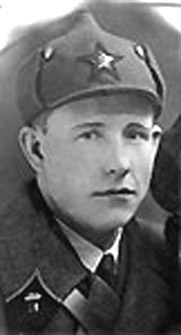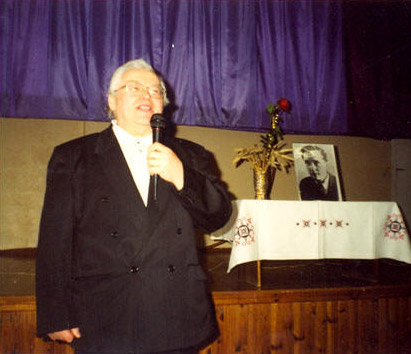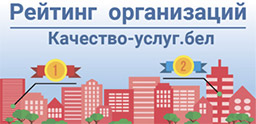Famous Compatriots

Ivan Fyodorovich Fyodorov (Ivan Fyodorovich Moskovitin) (c. 1510–1583) was an educator, inventor and printing pioneer in the East Slavic region.
In the 1550s-1560s he was a deacon of the St. Nicholas (Gosynsky) Church in the Moscow Kremlin. In 1564-1565, in collaboration with Pyotr Mstislavets, he published the first accurately dated Russian books. Fyodorov and Mstislavets had to flee Moscow due to the fallout with people in high places. In 1568-1570 Fyodorov published two books in the Zabludovo estate that belonged to the patron of Orthodoxy in Lithuania Hetman G.A. Khodkevich. In 1572 Fyodorov moved to Lvov where he established his own printing house and printed the first two accurately dated books.
In 1575-76 he was the steward of the Derman Holy Trinity Monastery, which was in the possession of Prince Ostrogsky. In 1578-81 he printed new books in Ostrog. In 1583 Fyodorov returned to Lvov where he got involved in casting cannons. He even demonstrated his invention – a folding cannon - to Emperor Rudolf in Vienna. He died in Lvov and was buried in St. Onuphrius Monastery.
According to the research of the Russian historian Evgeny Nemirovsky, the printer hailed from Petkovichi, the modern-day territory of Baranovichi District.

Andrei Rimsha (1550?-1595?) was a Belarusian poet, the founder of panegyric poetry in ancient Belarusian literature. He was born in the village of Penchin, Baranovichi District. In 1572 his Belarusian-language poetic "Chronology" (calendar) was published in the Ostrog printing house by Ivan Fyodorov. Rimsha was also known as a translator. His translations of the works by Roman Emperor Titus Flavius were very popular in Belarusian lands in the 16th century.

Joachim Litawor Chreptowicz – Count, deputy of several Sejms, marshal of the main tribunal of the Grand Duchy of Lithuania, last chancellor of the Grand Duchy of Lithuania. Founder of the Commission of National Education, a Belarusian and Polish poet, publicist and translator. He was born on 4 January 1729 in the Yasenets estate (Baranovichi District) to a family that belonged to the ancient Belarusian nobility. Its representatives played a significant role in the development of culture and education in the Grand Duchy of Lithuania.
He studied at the Vilna Academy. From 1765 he was marshal of the Grand Duchy of Lithuania and headed diplomatic missions in Paris and Vienna. He was one of the founders (1773) and later the head (for more than 20 years) of the Commission of National Education (the commission was engaged in the development and improvement of quality of education in the Grand Duchy of Lithuania). From 1780 he was the head of the royal organization of nobles and nobility in the Grand Duchy of Lithuania, from 1791 he was minister of foreign affairs, and from 1793 he was chancellor of the Grand Duchy of Lithuania.
In his estates, in Shchorsy and Vyshnev, he replaced the statute labor with the quitrent. He was the founder of the Library which was famous throughout Europe. Died on 4 March 1812.

Adam Mickiewicz (24 December 1798 – 26 November 1855) was a Polish and Belarusian poet, the founder of Polish romanticism, a figure in the national liberation movement. He was born in the village of Zaosye near the town of Novogrudok, which is now part of Baranovichi District. His father, Mikalai Mickiewicz, a lawyer, belonged to the small gentry. After graduating from school, Adam entered the Faculty of Physics and Mathematics of the University of Vilna where he studied for a year. In the spring of 1816 he transferred to the Faculty of History and Philology, from which he graduated in 1819.
He was a teacher in Kovno (now Kaunas; 1819-1823). Mickiewicz's early writings (the first poem was published in 1818) testify to his fascination with the free-thinking traditions of the Enlightenment. From 1817 he helped found patriotic youth societies of philomaths (“lovers of knowledge”) and philarets ("lovers of virtue"), wrote a number of programmatic poems for them, including "Ode to Youth" (1820) imbued with the romantic enthusiasm of young people who dreamed of fighting for freedom.
He was arrested in 1823 for his role in the Filaret Association of the Philomath Society and expelled from Vilna a year later. He stayed in Russia until 1829 (Petersburg, Odessa, Moscow, again Petersburg) where he made friends with prominent figures in the Decembrist movement (Kondraty Ryleyev, Alexander Bestuzhev) and famous writers (Alexander Pushkin and others) who highly appreciated his talent.
In 1829 Mickiewicz traveled to Germany, Switzerland, and Italy. After a failed attempt to join the November Uprising of 1830-31, the poet remained in exile for the rest of his life (he lived mainly in Paris). He continued writing and promoting revolutionary changes, took an active part in social and cultural events. In 1839-1840 he taught Latin literature in Lausanne, in 1840 he was appointed to the chair of Slavic languages and literatures at the Collège de France in Paris. Over the years he fell under the influence of the Polish philosopher Andrzej Towiański and his mystic and esoteric doctrines.
In 1848 Mickiewicz resumed his revolutionary activities and created the Polish Legion that fought for the liberation of Italy. In 1849 Mickiewicz founded a French-language newspaper La Tribune des Peuples (The Peoples’ Tribune), wrote articles promoting revolutionary and democratic values, showed interest in the utopian socialism and called for a revolutionary union of peoples. During the Crimean War of 1853-56, Mickiewicz went on a diplomatic mission to Constantinople, where he died of cholera (his ashes were buried in Paris and later moved to Krakow in 1890).

Pavlyuk Bagrim was a talented poet and blacksmith. He was born in the village of Kroshin, Novogrudok District, Grodno Governorate (now Baranovichi District) on 2 (14) November 1812. He went to a primary parish school. In 1828 an investigation was started against him in connection with the peasant unrest in Kroshin and the dissemination of the poem Riot of the Kholops.
The poem Play, Play, Little Boy is the only piece of his literary legacy that has survived. The poem has become Belarusian literature classics. Like his father, Bagrim was a blacksmith and achieved great mastery in this trade. A testimony to that is the chandelier kept in the Kroshin church. He was buried in the church cemetery in Kroshin around 1891.

Major Sergei Gritsevets (1909 – 1939) was a military pilot who was the first to be awarded the Hero of the Soviet Union title twice (in February and August 1939). He was born in the village of Borovtsy, Baranovichi District, on 6 July 1909. He took part in the Civil War in Spain in 1936 -1938 and in the Battles of Khalkhin Gol against the Japanese in 1939. During the war in Spain in 1936, he shot down 30 fascist aircraft, seven of them on one day. All in all, his victory tally counts around 40 enemy aircraft.
For his outstanding courage he was awarded the Hero of the Soviet Union title. The Battles of Khalkhin Gol were another opportunity for him to prove himself. During one of the battles, when his commander was forced to parachute out of a fire-ridden plane into enemy territory, Gritsevets landed nearby and gave his wounded commander a ride back to safe territory in his single-seat plane in front of the enemy’s eyes. For that, he was awarded the Hero of the Soviet Union title again.
He died on duty near the village of Bolbasovo, Orsha District, Vitebsk Oblast in September 1939.

Ivan Kabushkin (Jean) (1915-1943) was head of the operations group of the Minsk Soviet underground, organizer and executor of the largest sabotage activities against the occupation authorities.
He was born in the village of Malakhovtsy, Novogrudok Uyezd, Minsk Province (now Baranovichi District) on 15 February 1915.
His family moved to Kazan when he was a child. Before the war he worked as a tram driver.
He joined the Red Army in 1938. When the war broke out, he served as a junior lieutenant on the western border of the USSR. He was captured and transported to Minsk on 28 June 1941. Later he was able to escape. In autumn 1941 he joined the anti-fascist movement in occupied Minsk. He was member of the Military Council of the Partisan Movement, an underground organization of former Soviet servicemen who set it up in Minsk in autumn 1941.
Ivan Kabushkin was assistant chief of intelligence of a partisan detachment. He was in charge of the unit to identify and destroy traitors. His nickname was Jean. He proved himself to be an excellent underground fighter and was made head of the operations group.
He was good at disguise and could turn himself into an old man, a respectable barber, or a glossy Hitler officer. Jean could penetrate the places no other could. He headed the unit to combat Nazi agents and killed 20 agents of the Abwehr, SD and police.
He was captured by the Gestapo in the summer of 1943 and executed on 4 July.
On 8 May 1965 he was posthumously awarded the title of Hero of the Soviet Union.

Vladislav Golubok (autonym Golub; 1882-1937) was a Belarusian writer, playwright, director, actor, and artist.
He was born to a family of a railroader in Lesnaya station (now Baranovichi District) on 15 May 1882. He studied at a parochial school, passed an external exam at the Minsk city school (1906), and took an art course in Minsk.
He worked as a loader on the railroad, as a clerk in a store, as a mechanic in the Minsk depot. He served as an actor and director of the First Belarusian Drama and Comedy Society in 1917-1920. He was head of the art department of the People's Commissariat of Education of the BSSR in 1920-1922.
He set up a troupe of Belarusian artists (Golubok Troupe) in Minsk in 1920. The troupe was renamed into the Belarusian Third State Theater in 1932. The theater was widely known for the popularization of folk songs, music and dances.
He became the first People's Artist of the BSSR in 1928. He wrote about 40 plays, widely performed by Belarusian professional and amateur theaters.
In 1906 he began to publish his poems and prose in periodicals. He published his collection Apavyadanni [Stories] (St. Petersburg, 1913). He wrote about 40 plays and a number of journalistic and theatrical articles. He is also known as an artist-decorator and landscape painter.
He was arrested in 1937 and executed on 28 September 1937. He was rehabilitated posthumously in 1957.

Anatoly Klyshko was born to a peasants’ family in the village of Daneiki, Baranovichi District, Brest Oblast on 16 April 1935.
He went to Novogrudok Pedagogical School (1949-1952). He worked as a proofreader in the Novogrudok city newspaper Zvyazda, an executive secretary of the Fizkulturnik Belarusi newspaper. He graduated from the Philological Faculty of Belarusian State University (1958).
He was awarded the Medal of Francysk Skaryna and many others. He is Honored Worker of Culture.
































